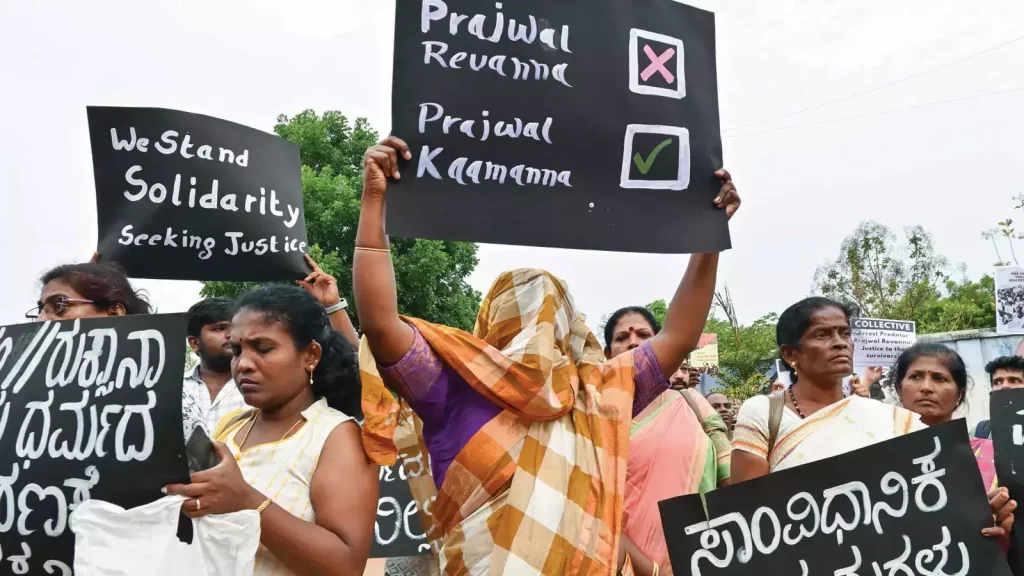Cases like the Karnataka sex scandal involving Prajwal Revanna and Unnao rape convict Kuldeep Sengar highlight the victimisation of assault survivors who face ostracism and stigma. Traditional norms hinder justice for them while the accused rarely ever face consequences for their actions.
Some are drooling lasciviously over the Karnataka sex scandal involving Prajwal Revanna, MP and son of former state health minister HD Revanna, and grandson of former Prime Minister and head of the Janata Dal (S), H D Deve Gowda. Others are analysing the impact on the election.
Prajwal’s pen drive with 2,976 sexual video clips of him allegedly forcing sexual acts on multiple women is all over social media. This has emboldened some survivors to file cases. Prajwal has decamped to Germany to avoid arrest.
His father, Revanna, is also in trouble. A former female employee at his house has alleged, “Whenever his wife Bhavani was away, Revanna would repeatedly touch me inappropriately, disrobe me, and sexually assault me.
”This highlights two terrible aspects of Indian society. One, powerful families control local police stations and are effectively above the law. Their children think they are immune from criminal complaints. That can have devastating moral consequences.
Sadly, the Gowda clan’s power is not exceptional. Across India, top politicians are masters in their satrapies. Anybody complaining against them will suffer terribly after a police rebuff. Once in a while their outrages come to light, but this has no impact on other satraps.
Prajwal Revanna case: Survivors isolate themselves over fear of social ostracism
Consider Kuldeep Singh Sengar, former BJP MLA. He allegedly raped a 16-year-old girl who came to him for a job in Unnao in 2017. Her father protested to the police, but was himself arrested and beaten to death by policemen in jail.
Desperate for justice, the girl set herself on fire outside the chief minister’s house. The courts intervened, and a police enquiry exposed the shocking truth. Later, a truck hit the car in which the girl was traveling with two aunts and her lawyer. Her aunts were killed, and her lawyer badly injured. What a tragic outcome for a girl who had the guts to complain. Will not her tale dissuade other victims?
Worse is the social impact on female survivors and their families. I find this far more shocking than even the sexual abuses. Surely women filmed performing forced sexual acts should receive the warmest sympathy and heartfelt support of their communities. Surely the molesters and rapists should be ostracised.
In other countries, survivors would have national sympathy. Traditions are different here
Alas, it is the survivors who are being ostracised by their communities. As for perpetrators, one newspaper report from the field says the revelations will have no impact on votes. Apparently, voters think nothing significant has happened.
Across Hassan district, several survivors and their families have fled to escape humiliation and social opprobrium. Traditional Indian society does not view raped women as victims of terrible crimes. It views them as scandalous women acting in porn clips. The humiliation is too much for many families to bear.
A woman who used to work in Revanna’s home was kidnapped to silence her. The police rescued her. Is she hailed as a heroine bringing horrible politicians to book? No, she and her family are scarred for life. Her son says, “The whole world knows about us now. How can we go back to our village and live? We are poor people fighting every day to make ends meet. The area where we lived will never accept us.
”Worse, the woman was too afraid to tell her family the truth. “She never told us about the assaults,” says the son. “We came to know only after the video went viral.” Our sick social norms stop a woman complaining of rape to her own family for fear of social disgrace.
In other countries, survivors would have national sympathy, and those coming forward to tell their tales would be called heroines. Traditions are different here, imbued with a patriarchal culture that commodifies women. They are viewed as possessions of their fathers and after marriage, of their husbands, rather than individuals free to do as they please. The practice of dowry further commodifies them.
One consequence is that a raped girl is viewed as ‘damaged goods’. People will say in Hindi “Neta ne ladki ko kharab kar diya” (the politician has made the girl bad). What distorted logic! Surely the man is bad, and the girl is not. But in traditional society, nobody will marry her. Other men will view her as a ‘bad girl’, as legitimate prey. Her family will be tainted.
An injured man will receive sympathy and help from community. But a raped woman will not, because she is seen as a commodity, and damaged at that.
We boast about becoming the third largest economy in the world, and the voice of the Global South. Let us attend first to the sickness in our society. Let us gain the capacity to feel shame.
This article was originally published by The Times of India on May 11, 2024.


